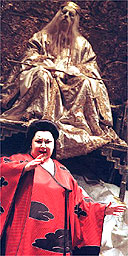
Anyone who comes out of Puccini's opera thinking that Turandot ought at least to apologise has my sympathy. She has caused an immense amount of trouble, brought terror to Peking, misery and death to her suitors, and is the despair of her father. She doesn't know how to respect a deal, so that, when her suitor Calaf actually solves the three riddles, she tries to wriggle out of it.
Calaf is a gentleman, and offers her a new arrangement, whereby if she can guess his name by dawn she escapes marrying him. But she interprets this as giving her a licence to torture and provoke the suicide of the loyal slave-girl, Liù. Liù kills herself and is mourned by all. Calaf goes on to woo Turandot, who eventually melts. The crowd responds by praising the power of Love, and the opera ends.
William Ashbrook and Harold Powers put the matter rather well when they say in Puccini's Turandot, The End of the Great Tradition (Princeton, £16.95) that "at first blush the closing passages of the play seem unmotivated, perhaps even shocking, as though Butterfly's suicide had been vulgarly and anticlimactically followed by a final love duet for Pinkerton and Kate". And first blush indeed. At second, third and fourth blush, in my case, though of course I very much admire this opera.
It is fascinating then to read that, in the Venetian play from which Puccini's and all other Turandots (for there are several) derive, the princess does indeed apologise at the end. She thanks the gods and implores their forgiveness for her obstinacy, then she addresses the audience, begging them to show their forgiveness by some sign - that is, by applauding.
This kind of ending is traditional (it is called a licenza) for a comedy or tragic-comedy of the kind Carlo Gozzi wrote. I've never read Gozzi but, like all opera-goers, I know a little of his work indirectly through knowing Turandot, and Prokofiev's Love for Three Oranges, and through possessing a crappy recording of Wagner's Die Feen (The Fairies). (Henze's König Hirsch and Busoni's Turandot would have a place in a better library than mine.)
Puccini hadn't read Gozzi either, when he was drawn to this story. What he knew was an Italian translation of Schiller's version of Gozzi, which had already lost many of its commedia dell'arte characteristics, including the original ending. A part of the Turandot problem comes from what happens when a story migrates across the genres. For there is not much comedy left in the tale by the time Puccini's librettists (Giuseppe Adami and Renato Simoni) have had their way with it, although one can guess that characters called Ping, Pang and Pong must derive from something like pantomime.
The major part of the problem comes from the fact that Puccini died leaving the work incomplete. Franco Alfano put together (using Puccini's notes) everything after Liù's death - that is, the duet between Calaf and Turandot, including an aria, "Del primo pianto", which is sometimes cut, but which does attempt to explain (though not excuse) Turandot's bad behaviour (she was afraid of Calaf).
As Andrew Clements pointed out recently in these pages, the new musical completion by Luciano Berio, first performed in 2002, has just become available on disc (though you wouldn't notice it in the small print: the compilation is called Puccini Discoveries, conducted by Riccardo Chailly on Decca). Berio essentially follows the same libretto text as Alfano did, but he solves the problem very differently. Essentially, Alfano ended with a fortissimo reprise of "Nessun Dorma", a celebration of Love's triumph, whereas Berio allows us to consider that this triumph still takes place in a bloody world, and at a cost to others around. It makes a wonderfully sympathetic transition, and I look forward to seeing it staged.
Ashbrook and Powers, in the interesting handbook I mentioned above, point out another difference between the Turandots of Gozzi and Puccini. In the original version, the princess tells a slave of her motives in behaving as she does: she does not hate the unknown prince, but she scorns men in general, for their faithlessness and insincerity and their habit of consorting with vile slaves and prostitutes.
The authors call this attitude proto-feminist, and contrast it with the motivation expressed in "In questa reggia". There, Turandot says that she hates all men because of what they did, thousands of years before, to her ancestress the Princess Lo-u-Ling. This is "feminism of a very different sort... where hatred for men as sexual beings is exteriorized in the Princess's desire to avenge a ravished a murdered ancestress... who stands in for all oppressed womankind".
Perhaps the key to the resolution of the Turandot problem, in terms of the fable as developed by Puccini and his collaborators, lay in the avenging of the memory of Lo-u-Ling. In the libretto, this unresolved crime seems to be forgotten when Turandot melts. Was it the true reason for her bad behaviour, or was it just a pretext? Somebody should have pointed out to Turandot that causing Liù to kill herself is no way to bring justice to womankind, or of honouring the memory of an ancient princess. But neither Alfano nor Berio had, or exercised, this option.

